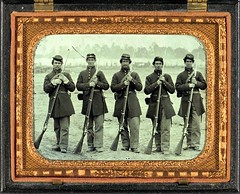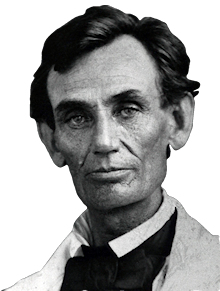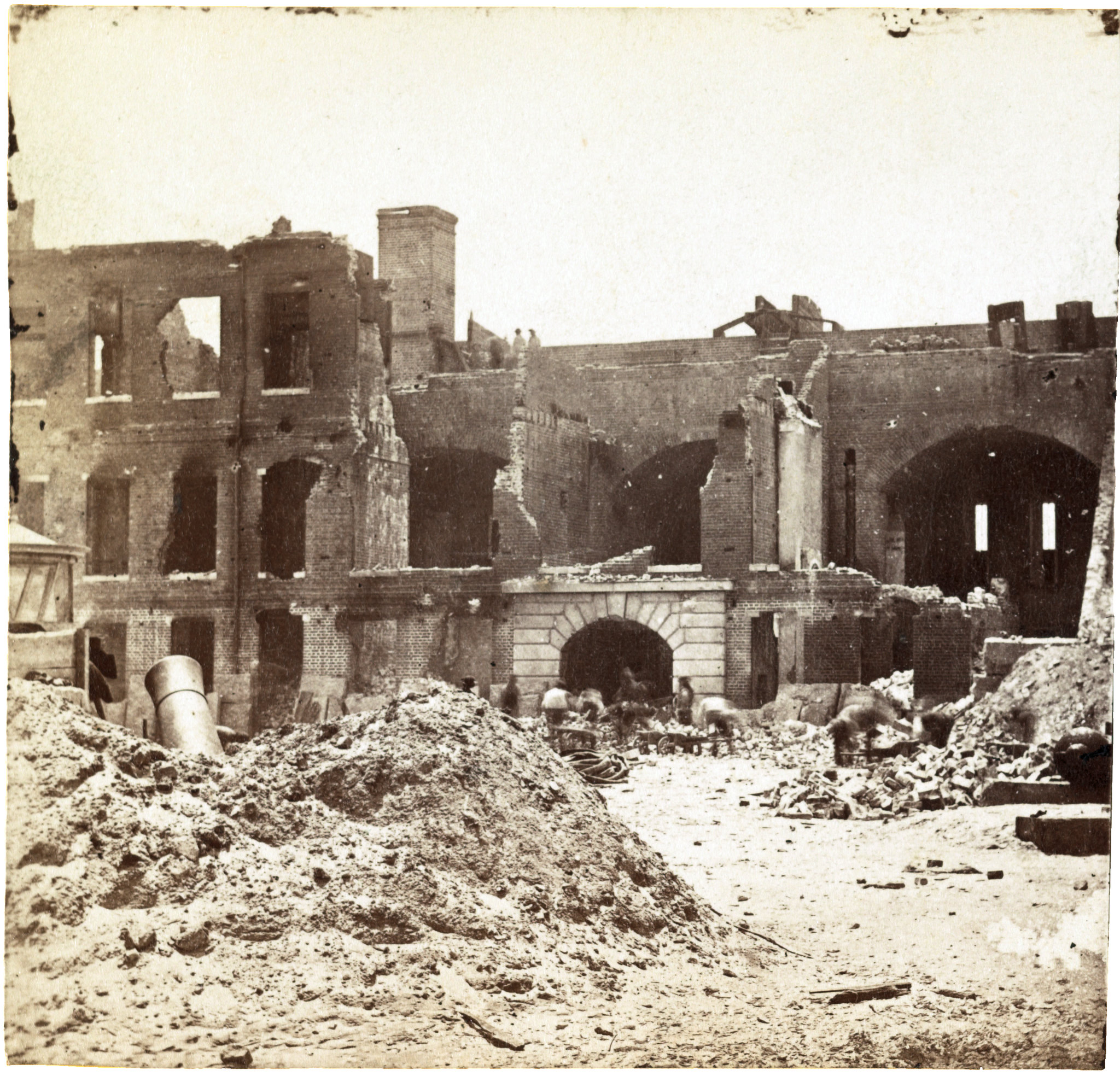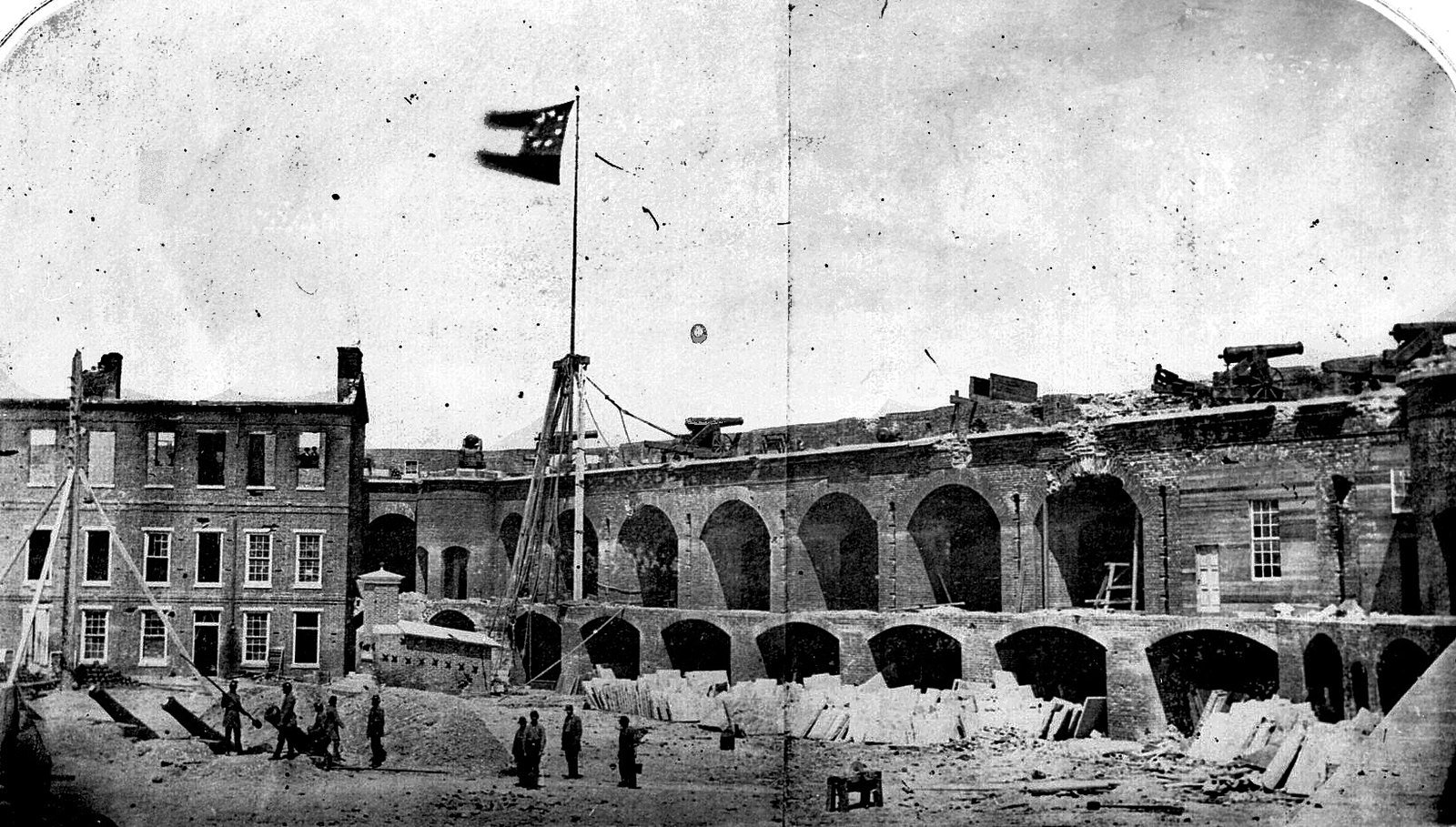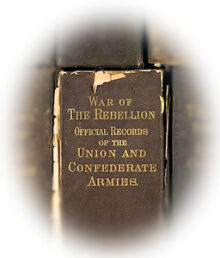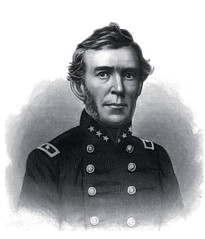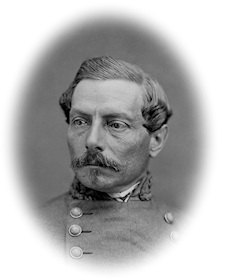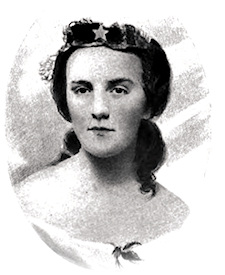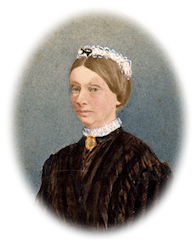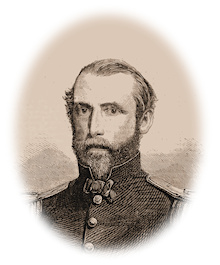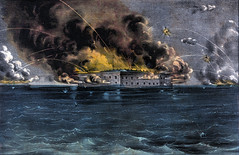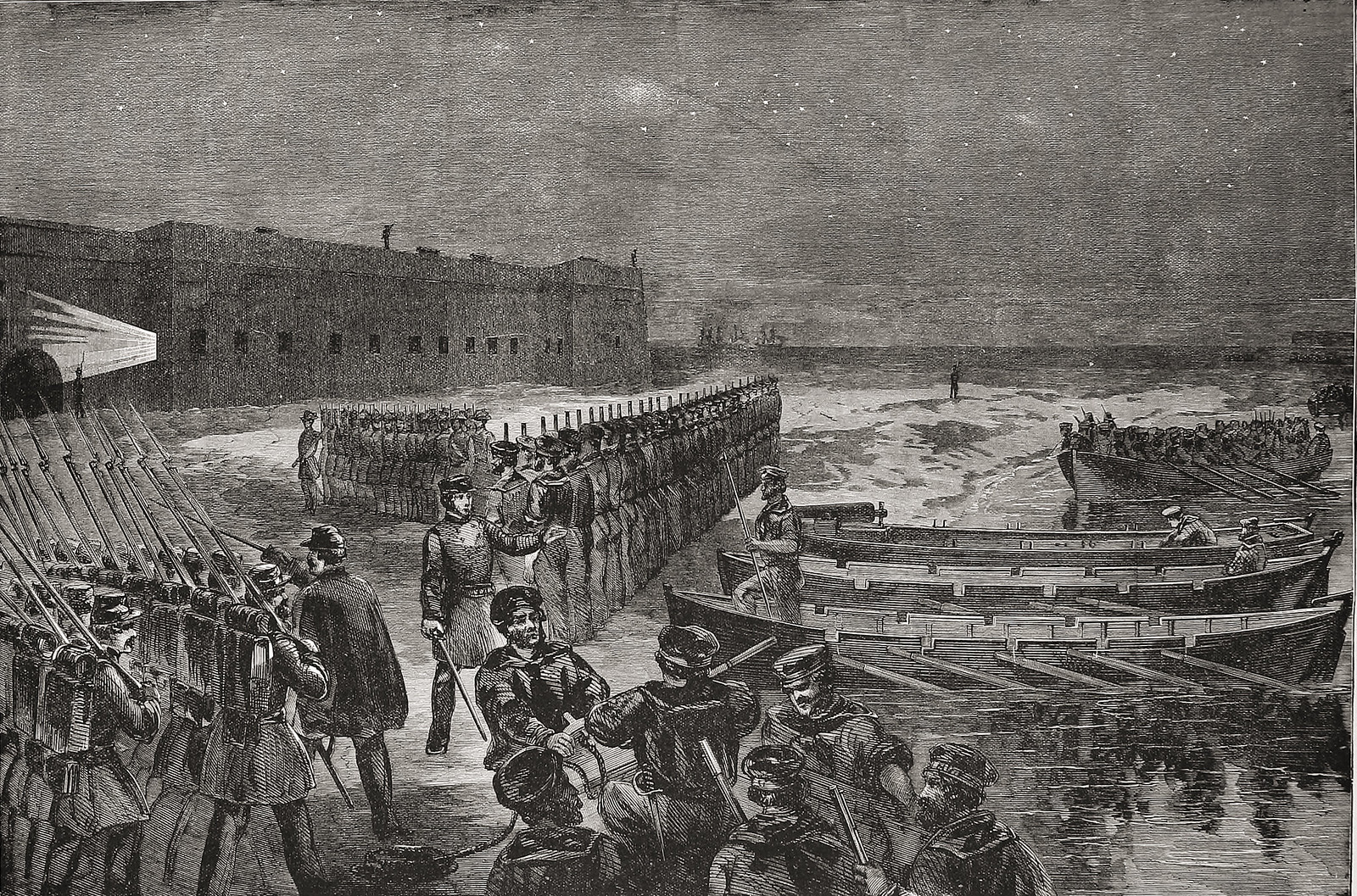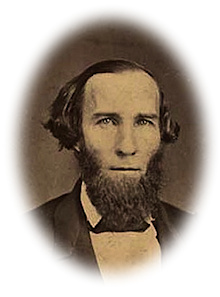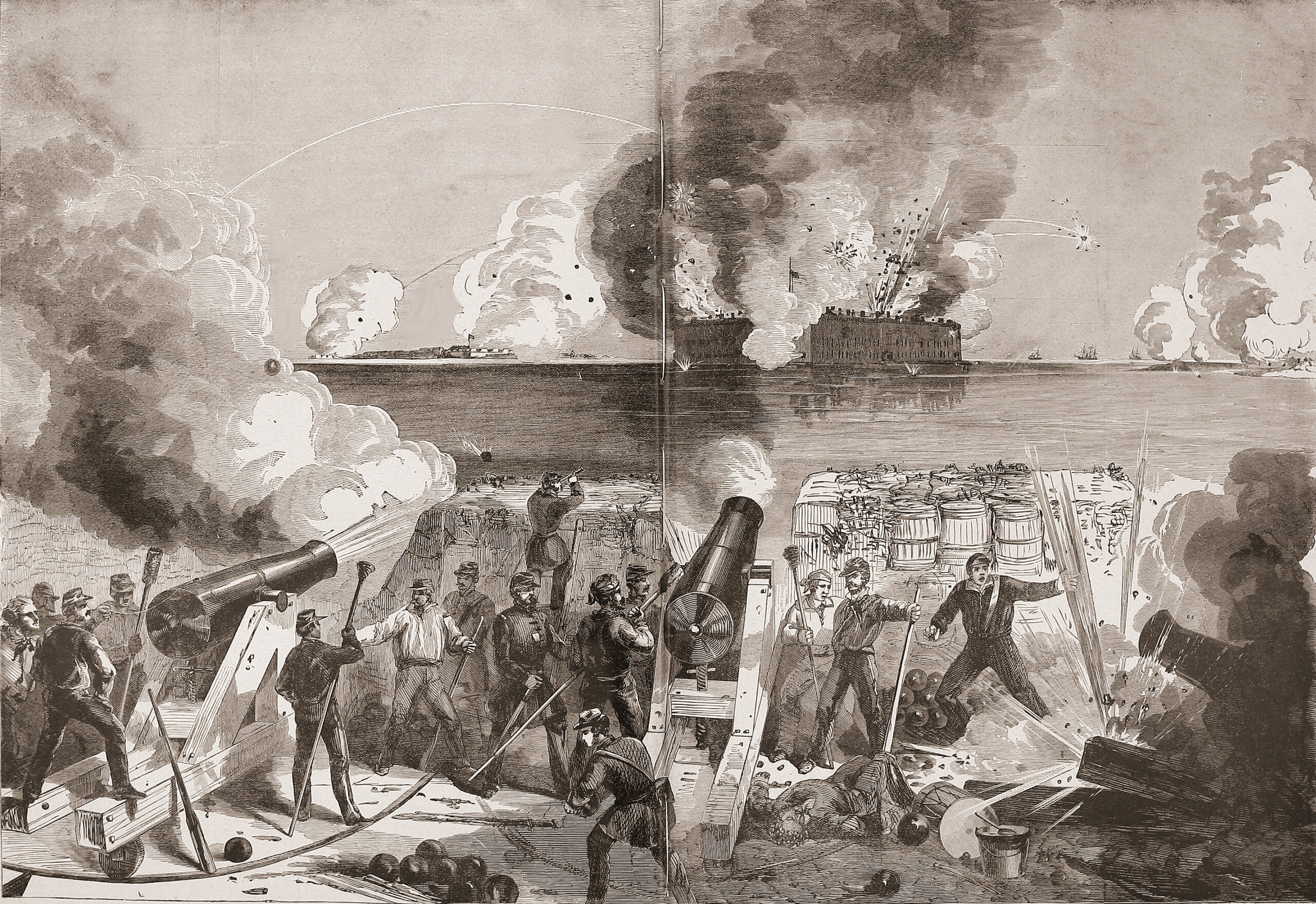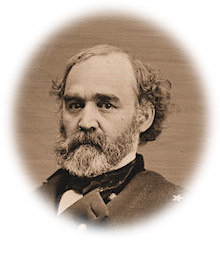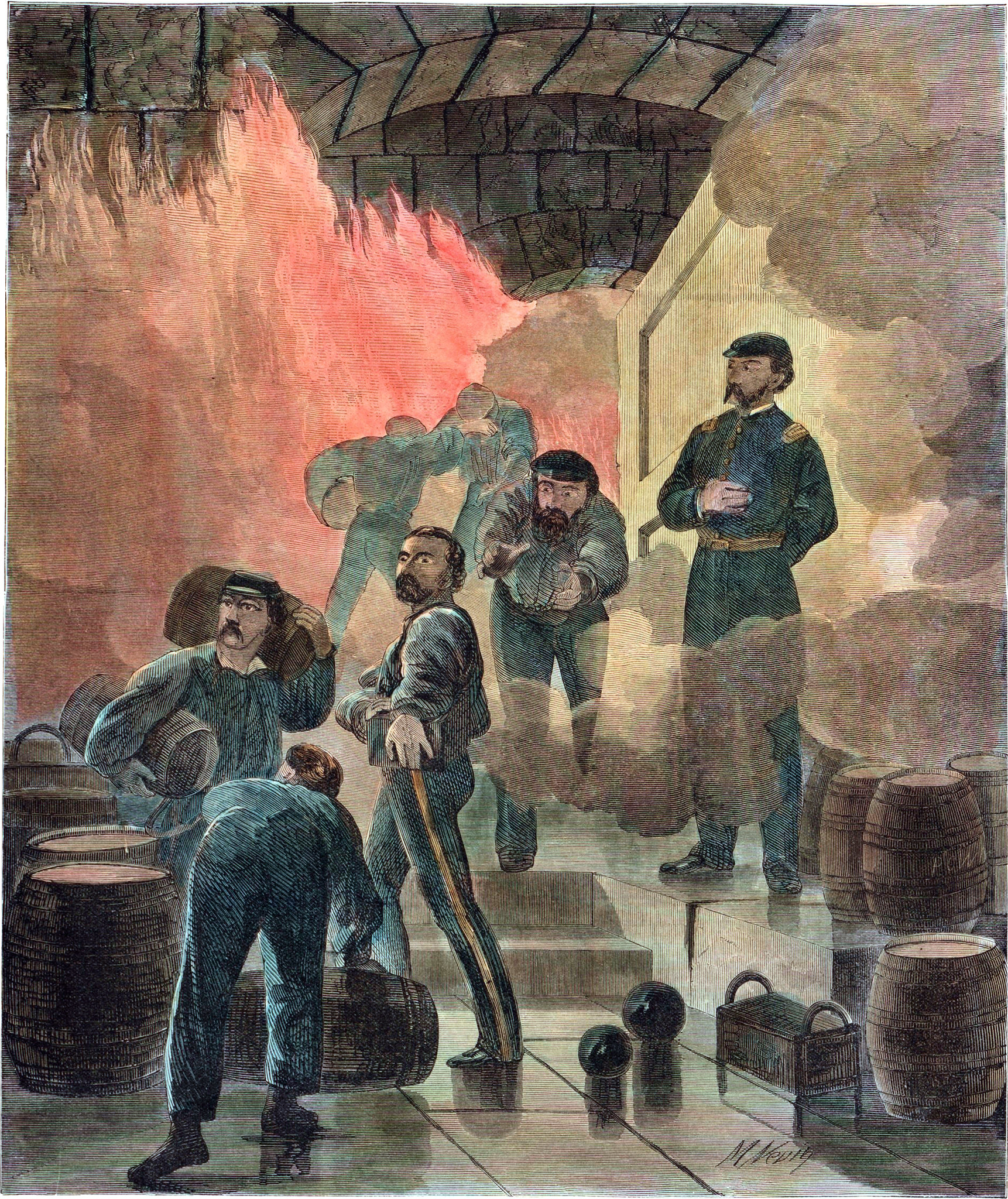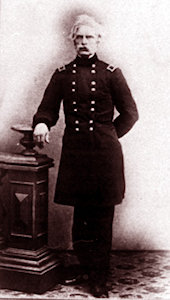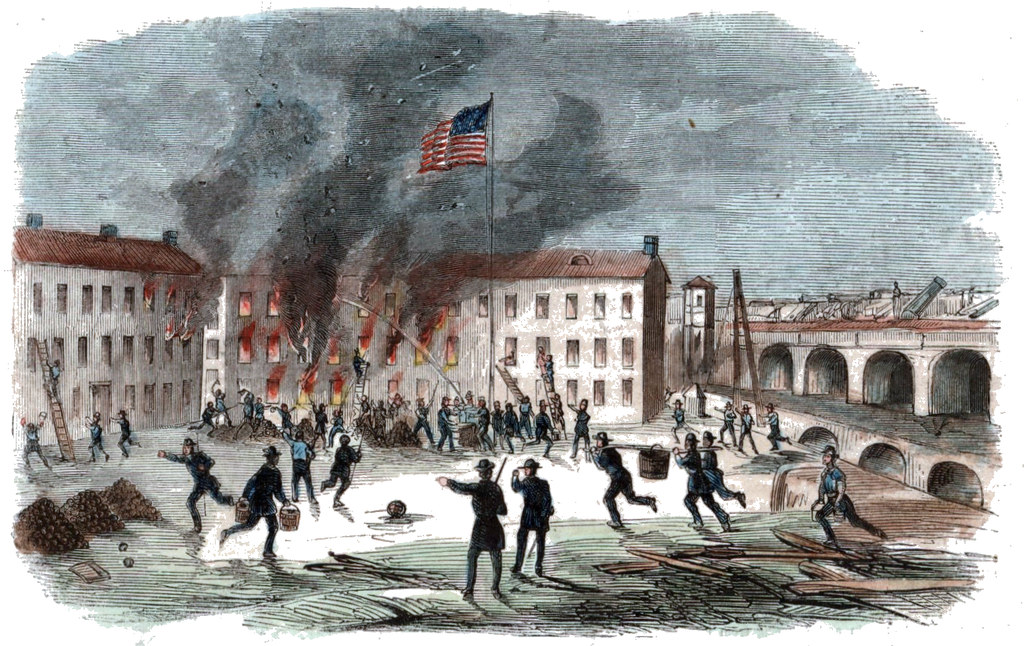CHARLESTON, April 13, 1861.
Hon. L. P. WALKER, Secretary of War;
Officers’ quarters in Sumter burning. Part of roof supposed to have fallen in. Sumter firing at long intervals. Ours regular and effective. Six vessels outside in signals with Sumter.
G. T. BEAUREGARD.
—–
CHARLESTON, April 13, 1861.
Hon. L. P. WALKER:
Anderson has hauled down the United States flag on Sumter and run up white flag. Fort has been burning for several hours from effect of shells. Two explosions have been produced by shells. He has ceased firing some time, and fire of all the batteries has been continuous till now–3 o’clock. Aides have been sent by Beauregard to Sumter.
R. B. RHETT, JR.
—–
CHARLESTON, S.C., April 13, 1861—2 p.m.
President JEFF. DAVIS, Montgomery, Ala.:
Quarters in Sumter all burned down. White flag up. Have sent a boat to receive surrender. But half an hour before had sent a boat to stop our firing and offer assistance.
G. T. BEAUREGARD.
—–
CHARLESTON, S.C., April 13, 1861.
Gov. F. W. PICKENS, Present:
DEAR GOVERNOR: I have sent Major Jones, Captain Hartstene, and Colonels Miles and Pryor to Major Anderson to tell him that I offer him the same terms that I did on the 11th, and that a vessel or steamer would be sent to him in the morning to take him to the steamer outside, and that he must be responsible in the mean time for the fort; otherwise, I would put four companies of artillery in there to-night. I also told Captain Hartstene to go out to the fleet and tell them that the fort was now ours, but under the safe-keeping of Major Anderson, and that no attack could be made upon it by them.
In the morning I will order two of Colonel Ripley’s companies and two of De Saussure’s to take possession of Fort Sumter.
Respectfully, your obedient servant,
G. T. BEAUREGARD.
—–
CHARLESTON, April 13, 1861.
Hon. L. P. WALKER:
Fort Sumter has unconditionally surrendered to the Confederate States, represented by General Beauregard, Colonel Wigfall, his aide, receiving the surrender. The same terms just offered will be granted. Engines are about to go down to put out the fire. Fight expected on Morris Island to-night.
R. B. RHETT, JR.
—–
CHARLESTON, April 13, 1861.
Hon. L. P. WALKER:
Anderson surrenders to the Confederate Government unconditionally, but I have granted him the same terms as on the 11th instant: “All proper facilities will be afforded for removal of yourself and command, together with company arms and property and all private property, to any post in the United States you may elect.”
G. T. BEAUREGARD.
—–
HEADQUARTERS MORRIS ISLAND, S.C.,
April 13, 1861—6 p.m.
General BEAUREGARD, Commanding.
GENERAL: Brigadier-General Simons directs me to say that a boat from the fleet, bearing a white flag, and commanded by a lieutenant of the U.S. Navy, has just communicated with him. He first inquired if Major Anderson had surrendered, to which (as informed by Colonel Wigfall, aide-de-camp) he was answered “Yes; unconditionally.” Second, if he could communicate with Fort Moultrie, to which he was answered “No.” (He evidently supposed the commanding general was at Moultrie, as he afterwards said.) Third, he asked if he could be permitted to come in, under a flag of truce, and take Major Anderson off. If not, whether he could come in with a merchantman and do the same. If not, that whether he could come in with his boats for the purpose. To these inquiries General Simons replied that transportation could be furnished for Major Anderson to the fleet, but that the commanding general was at hand, and could be communicated with at once, with the understanding that no hostile demonstration should be made during the night by the fleet. The lieutenant was informed that you would be furnished with his questions, and he might return for answers to-morrow morning, under a flag of truce. The lieutenant gave his personal guarantee that no hostilities would be attempted, and said he would return in the morning to hear your reply. He informed Major Whiting that their mission was not hostile, but one of peace.
Very respectfully,
W. H. C. WHITING,
Adjutant and Inspector General.
—–
CHARLESTON, April 13, 1861.
Hon. L. P. WALKER, Secretary of War:
We take possession of Fort Sumter to-morrow morning. I allow him the privilege of saluting his flag. No one killed on our side.
G. T. BEAUREGARD.
—–
MONTGOMERY, April 13, 1861.
General BEAUREGARD, Charleston:
Accept my congratulations. You have won your spurs. How many guns can you spare for Pensacola?
L. P. WALKER.
—–
HDQRS. FIRST BATTALION, THIRTY-THIRD REGIMENT,
SOUTH CAROLINA MILITIA,
April 13, 1861.
General D. F. JAMISON, Secretary of War:
SIR: Owing to the absence of Col. Charles Allston, jr., and being called on by the detachments stationed below this point to complete the chain of coast guard to the North Carolina line, in view of the emergency of the case (war having actually begun), I have taken upon myself to order out one hundred and forty-six men and twelve commissioned officers as follows: From Captain Daggett’s company, Waccamaw Light Artillery, twenty-six men and two officers, stationed as coast guard, from the redoubt at North Island to Murray’s Inlet; distance, twenty-five miles. From Captain Ward’s company, Watchesaw Riflemen, twenty men and two officers, stationed at the redoubt at Murray’s Inlet. From Captain Gillespie’s company, Carolina Greys, forty men and three officers, stationed as coast guard, from Murray’s Inlet to the redoubt at Little River, North Carolina line; distance, forty miles. From Captain Litchfield’s company, All Saints’ Riflemen, thirty men and three officers, stationed at the redoubt at Little River. I have also, by request, ordered a detachment of thirty men and two officers from Captain Johnson’s company, to take post at the redoubt at the entrance of Santee River, that post being unoccupied. Have also taken possession of thirty muskets for said detachment from a quantity here in store. Also, a quantity of army stores.
I have detailed Captain Daggett as bearer of this report, who will furnish any further information you may require as to the defense at this point.
All of which is respectfully submitted; and, hoping it may meet your approbation, I am, very respectfully, yours,
W. C. WHITE,
Major, Commanding.
—–
HEADQUARTERS ARTILLERY, S. I. AND M. P.,
Fort Moultrie, S.C., April 13, 1861.
Maj. D. R. JONES, Adjutant-General:
MAJOR: I have the honor to report that we have had only two personal casualties in the force under my command, both very slight, and are privates in Company A (Sullivan and Miller). The effect of the enemy’s fire upon this fort has been pretty effectually to demolish the quarters and to injure the hot-shot furnace to a certain extent. The effects of the Sumter, enfilade, Dahlgren, floating, and mortar batteries, has been to keep the enemy from his barbette guns. The direct fire has been quite accurate for the distance, several shots having passed through the arches of the second line of casemates, two or three into his lower embrasures, and many grazing the crest of his parapet and penetrating the roof of his quarters. Still, our direct fire is only annoying, and I have directed it to be economized, to look out and keep the men as fresh as possible for the channel fight, which, it is to be presumed, is impending. I note what has been said respecting the hot-shot furnace, and shall endeavor to attend to it, although it has three shot-holes in it, which has already rendered one bar inefficient. I have directed Captain Hamilton, and the floating battery especially, to be economical with their ammunition, and have to request that the latter be supplied with one hundred rounds of shell and one hundred cartridges, with appurtenances, by boat this evening from the city. All our 9-inch and 8-inch shells are defective, and Captain Hamilton has filled several with rice to use them as solid shot. It would be well to have the floating battery supplied also, if possible, with 42 and 32 pounder ammunition, as it will be especially effective in keeping out re-enforcements.
I also have to suggest that Captain Martin be supplied with one hundred and fifty shell and ammunition, with authority to practice as much as he pleases until he gets his shell in. All the mortar practice is wild, owing to the range and the effect of the wind. As I am sorely pressed for time, I have respectfully to request that such requisitions as are approved may be ordered from headquarters.
I am, very respectfully, your obedient servant,
R. S. RIPLEY,
Lieutenant-Colonel Artillery, Commanding.
P. S.–One of the rear transoms of Captain Hallonquist’s mortars, being made of pine, is split. I shall endeavor to have it repaired. The merlons stand very well, except the vertical palmetto logs, which collapse under our own fire. One 42-pounder shot entered the embrasure, but, being stuffed with a cotton bale, had no further effect than to take a splinter off a carriage. The new 8-inch columbiad carriages will not stand much.
Very respectfully,
R. S. RIPLEY.
—–
CHARLESTON, S.C., April 13, 1861.
Brig. Gen. JAMES SIMONS, Morris Island, S.C.:
MY DEAR GENERAL: The accumulation of troops on Morris Island requires that another general officer should be sent to the southern end of that island. General Bonham has consented to go there in command, until we can divide the forces into two brigades, when he will assume command of the whole as major-general, to act under my orders. In the mean time, should circumstances bring your commands together, he will necessarily assume the command; otherwise to attend only to his half (about) of the island, and you to yours, but to mutually assist and support each other, in case of need, and in the defense of our country and sacred cause.
Major Whiting will remain acting inspector-general of the whole island. He will communicate (as well as yourself) all the information in his possession to General Bonham. I will endeavor to be with you as soon as practicable, or whenever required.
Respectfully, your obedient servant,
G. T. BEAUREGARD,
Brigadier-General, Commanding.
—–
HDQRS. PROV. ARMY CONFEDERATE STATES OF AMERICA,
Charleston, S.C., April 13, 1861.
Brig. Gen. R. G. M. DUNOVANT,
Commanding Sullivan’s Island, S.C.:
GENERAL: Major Anderson will evacuate Fort Sumter to-morrow morning, when he will be sent to one of the United States vessels outside of the harbor. He will be allowed the privilege of saluting his flag on lowering it.
You will please direct that the ranking officers of Engineers and Artillery on the island accompany the detachment of one company already ordered out, as part of a garrison to Fort Sumter, who will make a report of the exact present condition of the fort and of its defenses.
You will also direct Capt. George S. James to hold his company at Fort Johnson in readiness to move for the same purpose, as soon as orders to this effect are extended to him.
I remain, general, very respectfully, your obedient servant,
G. T. BEAUREGARD,
Brigadier-General, Commanding.
—–
HDQRS. PROV. ARMY CONFEDERATE STATES OF AMERICA,
Charleston, S. C., April 13, 1861.
General JAMES SIMONS,
Morris Island, S. C.:
GENERAL: Major Anderson will evacuate Fort Sumter to-morrow morning, when he will be sent to one of the United States vessels outside of the harbor. He will be allowed the privilege of saluting his flag on lowering it.
You will please direct that the ranking officers of Engineers and Artillery on the island accompany the detachment of one company, already ordered out as a part of a garrison to Fort Sumter, who will make a report of the exact present condition of the fort and its defenses.
I remain, general, very respectfully, your obedient servant,
G. T. BEAUREGARD,
Brigadier-General, Commanding.
—–
FORT MOULTRIE, S.C.,
April 13, 1861.
General BEAUREGARD, Charleston, S.C.:
GENERAL: Fort Sumter has been set on fire, and as it is very important (with the vessels outside threatening to enter) to have all experience, I have determined to remain and avoid or prevent a re enforcement. I do not think that there are more than three vessels off. Colonel Ripley and myself will endeavor to prevent an entry here to-night. I will, as you said, make myself useful; more so, probably, than I could at any other point. I shall go out in a row-boat during the night, with signals arranged, and reconnoiter the entrance and give timely notice of any boats approaching. I think the fire-hulk inside of Sumter had better not be lighted, as it will probably dim our vision.
I have just made out the vessels off. They are the Pawnee, Harriet Lane, Nashville, Atlantic, and a merchant schooner. They cannot enter in their vessels. With a good lookout (for a lookout stationed here, and a boat off in the channel, together with their fire-hulks, which are still floating in a line around Fort Sumter), I think you need have no fear of an entrance here. They are all here, and in fine spirits. Ripley is a most valuable officer–cool: collected, and energetic. He keeps all in spirits and up to their work. I have all the batteries on this island, and give the best directions, as I think may be useful, particularly in regard to looking out for and firing at boats or shipping. The guns are all intact, and in fine working order.
Respectfully,
H. J. HARTSTENE.
—–
HEADQUARTERS MORRIS ISLAND, S.C.,
April 13, 1861.
General BEAUREGARD, Charleston, S. C.:
MY DEAR GENERAL: We require one thousand or twelve hundred men to re-enforce this position. Nothing should be left to chance. None have yet arrived, and this command will be worn out. The troops have been under arms all night. Six of the hostile ships are in the positions they occupied at dark last night. The two nearest are the Lane and the Pawnee. With these vessels so close to us, I cannot relax my vigilance without such a force as would render a coup de main impossible. The men behaved very well and kept well on the alert. I visited the whole line last night (after midnight) and found everything quiet; but you are aware that this cannot last over such a long line of defenses, with an uncertainty as to the point of attack. Opinions differ as to whether anything got into Sumter last night. There may or may not. The night was dark, and occasionally stormy, and a heavy sea running. If anything did, it could not have been very extensive. Perhaps they desire to lay off, and send in one boat at a time or once a night. This is the most feasible plan, and that which I most fear. If it is in your power I beg you to come here for myself personally. I am nearly broken down for want of rest. The gentlemen you sent are very efficient. Quartermaster Hatch should send down tents for the general and his staff. We are without accommodations, and are temporarily in the hospital, which we may at any time be compelled to leave.
Very truly, yours,
W. H. C. WHITING.
[Indorsement.]
I hardly think the additional one thousand men could act on that island, and he ought to order the men to sleep in daylight and enforce it.
F. W. P.
—–
GENERAL ORDERS, NO. 3.
WAR DEPARTMENT,
ADJ’T AND INSPECTOR GENERAL’S OFFICE,
Montgomery, Ala., April 13, 1861.
In honor of the occasion, officially announced, that the United States colors have been hauled down at Fort Sumter and replaced by the white flag, a salute of fifteen guns will be fired in front of the Department this day at two o’clock.
By command of the Secretary of War:
S. COOPER,
Adjutant and Inspector General.
